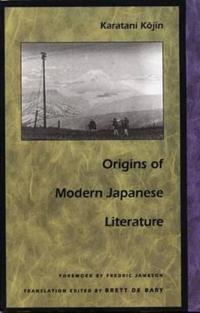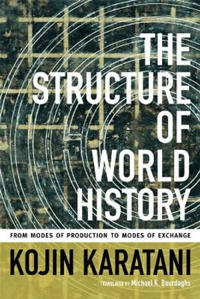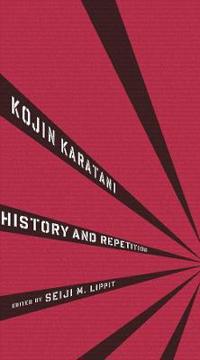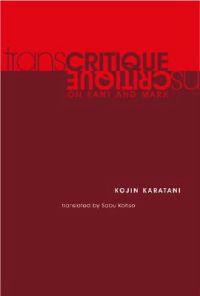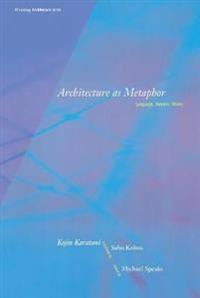Origins of Modern Japanese Literature (Pocket)
avKaratani Kojin, Brett (TRN) De Bary, Stanley Eugene (EDT) Fish
ISBN: 9780822313236 - UTGIVEN: 1993-05Since its publication in Japan ten years ago, the "Origins of Modern Japanese Literature" has become a landmark book, playing a pivotal role in defining discussions of modernity in that country. Against a history of relative inattention on the part of Western translators to modern Asian critical the[...]
The Structure of World History (Inbunden)
avKojin Karatani, Michael K. (TRN) Bourdaghs, Kojin Karatani
ISBN: 9780822356653 - UTGIVEN: 2014-03In this major, paradigm-shifting work, Kojin Karatani systematically rereads Marx's version of world history, shifting the focus of critique from modes of production to modes of exchange. Karatani seeks to understand both Capital-Nation-State, the interlocking system that is the dominant form of mod[...]
The Structure of World History (Pocket)
avKojin Karatani, Michael K. (TRN) Bourdaghs, Kojin Karatani
ISBN: 9780822356769 - UTGIVEN: 2014-03In this major, paradigm-shifting work, Kojin Karatani systematically rereads Marx's version of world history, shifting the focus of critique from modes of production to modes of exchange. Karatani seeks to understand both Capital-Nation-State, the interlocking system that is the dominant form of mod[...]
History and Repetition (Övrig)
avKojin Karatani
ISBN: 9780231157285 - UTGIVEN: 2011-11-22Kojin Karatani wrote the essays in History and Repetition during a time of radical historical change, triggered by the collapse of the Cold War and the death of the Showa emperor in 1989. Reading Karl Marx in an original way, Karatani developed a theory of history based on the repetitive cycle of c[...]
History and Repetition (Häftad)
avKojin Karatani
ISBN: 9780231157292 - UTGIVEN: 201111Kojin Karatani wrote the essays in History and Repetition during a time of radical historical change, triggered by the collapse of the Cold War and the death of the Showa emperor in 1989. Reading Karl Marx in an original way, Karatani developed a theory of history based on the repetitive cycle of c[...]
Transcritique on Kant and Marx (Inbunden)
avKojin Karatani
ISBN: 9780262112741 - UTGIVEN: 2003-06Kojin Karatani's Transcritique introduces a startlingly new dimension to Immanuel Kant's transcendental critique by using Kant to read Karl Marx and Marx to read Kant. In a direct challenge to standard academic approaches to both thinkers, Karatani's transcritical readings discover the ethical roots[...]
Architecture as Metaphor (Pocket)
avKojin Karatani, Sabu (TRN) Kohso, Michael (EDT) Speaks
ISBN: 9780262611138 - UTGIVEN: 1995-10This work explores the relationships between architecture and philosophy, literature, linguistics, city planning, anthropology, political economy, psychoanalysis and mathematics. The author shows the necessity of construction, deconstruction, and a complex, secular construction/deconstruction.[...]

